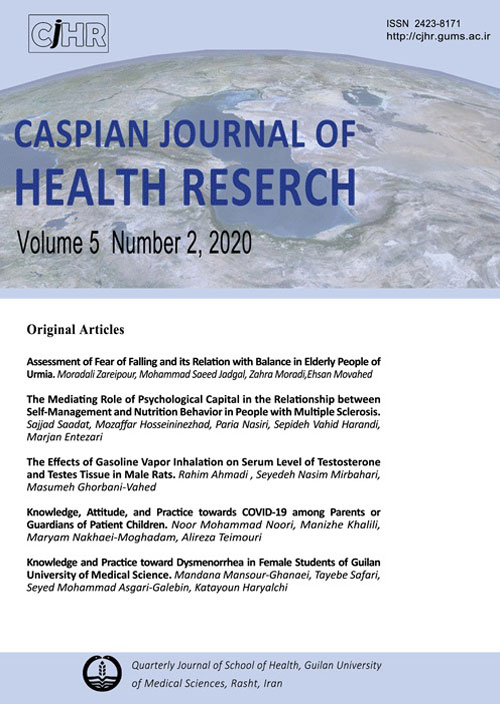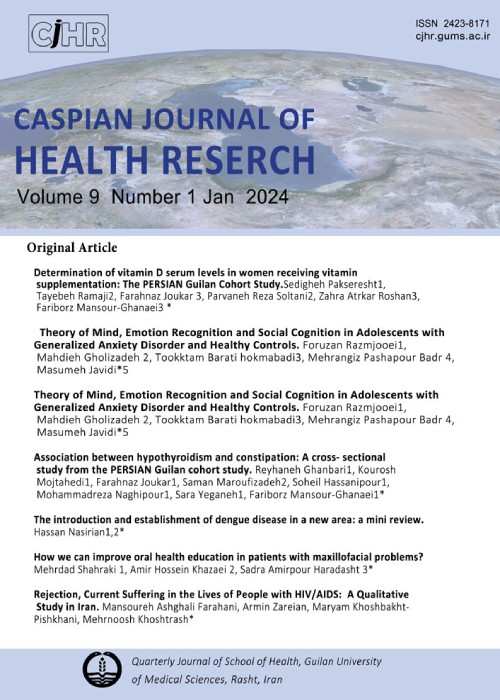فهرست مطالب

Caspian Journal of Health Research
Volume:5 Issue: 2, Jun 2020
- تاریخ انتشار: 1399/09/26
- تعداد عناوین: 5
-
-
Pages 23-27Background
Falling is a serious problem in the elderly population and one of its complications is fear of falling. Fear of falling is one of the threatening factors of elderly health. This study aimed to investigate fear of falling and its relationship with balance in elderly in Urmia.
MethodsThis is a descriptive-analytic study that 200 elderly people were selected by random cluster sampling. Required data were collected using a two-part questionnaire including demographic information and Self-efficacy Fear Questionnaire. Data were analyzed using logistic regression test in SPSS v.21.
ResultsThe results showed that 52.5%, 27.5%, 20% of the elderly had moderate, severe, mild fear of falling, respectively. Results of logistic regression showed age (OR = 2.1, p = .04), female (OR = 1.4, p = .02), living alone (OR = 1.8, p = .05), history of falling (OR = 1.9, p = .008), low balance (OR = 4.1, p = .001), increases the likelihood of fear of falling in elderly.
ConclusionThe findings of this study showed that the level of fear of falling in the elderly is relatively high and appropriate and effective preventive interventions should be carried out according to the factors in the fear of falling in the elderly.
Keywords: Fear, Fall, Elderly, Balance, Urmia -
Pages 28-33Background
The aim of this study was to investigate the direct and indirect effects of self-management on Nutrition Behavior (NB) with the mediating role of Psychological Capital (PC) in People with Multiple Sclerosis (PwMS) in Gilan province.
MethodsWe studied PwMS in Guilan MS Society (GMSS) in a cross-sectional design research in 2019. We invited 275 PwMS to participate in the study either through convenience sampling method. Data collection tool consisted of questions about demographic characteristics of participants, a revised form of Multiple Sclerosis Self-Management Scale (MSSM-R), Psychological Capital Questionnaire (PCQ), and Health-Promoting Lifestyle Profile II (HPLP-II). Data were analyzed using Pearson correlation coefficient and Structural Equation Modeling (SEM) in SPSS 19.0 and Amos 18.0 statistical software.
ResultsThe results showed that nutrition has a significant positive correlation with self-management (r = 0.342), self-efficacy (r = 0.211), optimism (r =0.208), hope (r = 0.316), resiliency (r = 0.237), and PC (r = 0.287) (P-value < 0.001). Additionally, the results showed that the direct and indirect effect of self-management on nutrition was significant and the proposed model had a good data fitting. The VAF index showed that 18% of the total effect of self-management on nutrition behavior is indirectly explained by the mediating variable of psychological capital.
ConclusionSelf- management and PC were associated with NB in PwMS. The results of this study support the importance of these factors in health-promoting behaviors with regard to NB and the proposed model can be a suitable option in health care and nursing provided that, the fit of this model is investigated in future research and other provinces.
Keywords: Multiple sclerosis, Nutrition, Self-management, Psychological capital -
Pages 34-38Background
Studies show that inhaling gasoline gas can damage various parts of the body. The aim of this study was to determine the effects of gasoline vapor inhalation on serum testosterone level and testes tissue in male rats.
MethodsIn this study, male Wistar rats were randomly divided into control group and groups exposed to gasoline vapor for 1, 2 or 3 h/day of 5 rats in each group. After 12 weeks, blood samples were collected using cardiac puncture method. Serum testosterone level was measured using radioimmunoassay method. Testes tissue was also examined histologically using H&E staining method. Data were statistically analyzed and compared between groups using one way- ANOVA.
ResultsSerum testosterone level significantly increased in all groups exposed to gasoline vapor compared with control rats (P<0.001). There was also lower number of spermatogonia in the groups compared to control rats (P<0.001). The number of spermatocytes and Sertoli cells, and the seminiferous tunnel diameter did not significantly change in groups exposed to gasoline vapor compared with control rats.
ConclusionInhalation of gasoline vapor had deleterious effects on testis tissue, resulting in decreased number of spermatogonia cells.
Keywords: Gasoline vapor, Testosterone, Testis, Rat -
Pages 39-44Background
Knowledge, attitude, and practice (KAP) is necessary for better management of COVID-19. The study aimed to assess knowledge, attitude, and practice about COVID-19 among parents or guardians of children who referred to the pediatric clinics, until March 16, 2020, in City of Zahedan City located at southeast of Iran.
MethodsA researcher-made questionnaire was developed and given to the parents or guardians of illness children who referred to the Pediatric hospital of Ali Asghar to visit pediatricians. Demographic characteristics and KAP score was assessed. T-test and ANOVA tests were used for data analysis considering 0.05 as significant error.
ResultsOf 524 participants, 60.1% were female. The mean age of participants was 32.15
(SD = 7.69). There was positive correlation between knowledge and attitude (r = 0.308), knowledge and practice (r = 0.233), and attitude and practice (r = 0.207). Illiterate parents had lowest knowledge score compared to other educational level. Married participants had significantly higher score of knowledge and practice than divorce or widow participants.ConclusionThis study concluded that the participants had good knowledge, positive attitude and sufficient practice towards COVID-19. Knowledge was associated with educational level and marriage status of parents or guardians of patient children.
Keywords: Knowledge, Attitude, Practice, Parents, Children -
Pages 45-49Background
Understanding the knowledge and performance status of young girls regarding dysmenorrhea can be an initial step towards the future health planning for this group. This study aimed to determine the knowledge and practice of female students about dysmenorrhea.
MethodsIn this descriptive cross-sectional study, 315 female students were randomly selected. Data collection form included two parts. The first part consisted of questions regarding demographic characteristics and field of study, and the second part was knowledge and practice questionnaire. The scores were compared in terms of study variable.
ResultsPrevalence rate of dysmenorrhea was 75.2% and the most frequent symptoms was aggression and anger (49.3%). Of total, 15.6% had good knowledge. The level of knowledge was significantly associated with field of study and dysmenorrhea. The midwifery students had the highest mean level of knowledge. The mean score of knowledge in students who had experienced dysmenorrhea was higher than girls who had not experienced dysmenorrhea (P-value = 0.031). There were no significant differences of practice scores in terms of study variable.
ConclusionThis study revealed a high prevalence of dysmenorrhea during menstrual period among female students. However, the study subjects had insufficient knowledge and moderate practice to reduce menstrual pain. It is recommended that more counseling education to be extended for female students to help them cope with the dysmenorrhea.
Keywords: knowledge, practice, dysmenorrhea


